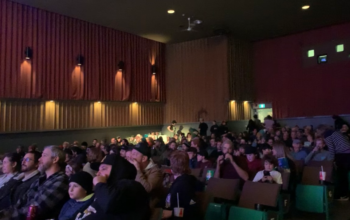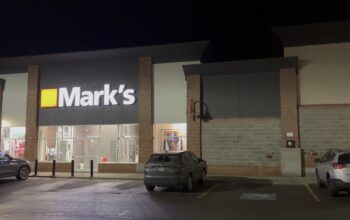Kamloops Film Society (KFS), responsible for the Kamloops Film Festival and the Twin Rivers Drive-In celebrated its 50th anniversary in September. The KFS started as the Cariboo Film Society and was formed at Cariboo College, now known as Thompson Rivers University, in 1973. While KFS has found its home in many theatres around Kamloops, it has found a home at the Paramount Theatre in April of 2019. Tom Friedman, the chair of KFS, says that the Paramount theatre was owned by Landmark Cinema, the competitor of Cineplex; however, in 2018, they were going to leave the Kamloops location. That was when Ron Fawcett from the Kelson Group approached Friedman about wanting to “retain a movie theatre in downtown” and not wanting the “theatre sold and torn down and developed with condos.” Friedman explains that The Paramount is “owned by the Kelson group but leased to the Film Society.”
The Paramount Theatre is the central location where the KFS screens their movies. However, during the summer, they operate the Twin Rivers Drive-In. The drive-in is a unique way to watch movies and excites patrons with a new way to experience film. Other events they hold are the Thursday Film Series, the Indigenous Film Festival, the CinéLoops: French Film Festival, the Kamloops Film Festival and the Kamloops Independent Short Shorts, hosted at the Paramount Theatre.
The Paramount Theatre is tiny compared to the Cineplex at Aberdeen Mall. The Paramount has two screening rooms, whereas Cineplex has eight. When movies get released in theatres, Cineplex has the first choice of what they can screen. This means that Paramount can not show the films Cineplex chose until they have finished screening them. While Paramount has limited screening rooms, they will play around ten movies a month and update their film lineup monthly. Paramount chooses to screen movies that generally would not be shown at big-name cinemas; they choose to offer local, independent, or international films. Friedman exclaims that the KFS wants “to show films that challenge audiences, entertain them and provide a lot of thoughtful connections…” that can be discussed after the film ends.
The pandemic hit shortly after the KFS was established at the Paramount Theatre, and they had to shut down operations. Since KFS was open for less than a year when the Coronavirus pandemic happened, it created a challenge that they had to overcome. Friedman says that the only way they “succeeded was through support from government grants” offered to businesses during the pandemic. After the Covid restrictions had been lifted, KFS had a tough time bringing back an audience. Friedman says that “people had to get comfortable with returning and being in contact with others in public places” (Friedman). However, with the love and passion for cinema, larger audiences started to return over time.
As the world has shifted to a digital age, society has become engrossed in digital streaming. With apps like Netflix, Disney+, and Amazon Prime have come to the forefront of at-home moviegoers, KFS has always put the theatre experience first. While watching it at home may be convenient, Friedman believes that being able to experience the film with others enhances the watcher’s experience. Friedman also finds that a “huge advantage [of the theatre] … is the ability to have the big screen… and having it on the big surround sound in the theatre makes a huge difference.” The KFS focuses on keeping a collective cinema experience by screening “hand-picked, diverse, high-quality films and supports film-related activities” (Kamloops Film Society). Including these diverse films sets them apart from big companies like Cineplex and Landmark Cinemas by screening more independent or smaller films instead of mainstream films or big blockbusters. Their mission is “to bring the best in independent, Canadian and foreign cinema to Kamloops. The Society’s series and festival bring film lovers together to experience the best in cinema” (Kamloops Film Society).
Supporting the KFS can strengthen Kamloops’ art-related scenes and contribute comfort at the Paramount Theatre. Ways to help are attending their screenings, renting out a room, subscribing to their membership, and donating to the Comfy Chair Campaign. Supporting this local business helps them by keeping the business running, helping the local economy and creating more opportunities for Kamloops to fund more arts-related centers. Renting out one of the two theatres is an excellent way to have “birthday parties [or a] date night rental package, which is a lovely way for a couple to enjoy a private screening of a movie.” If patrons want to contribute to the KFS, they could donate to the Comfy Chair Campaign, which aims to remove the old seats in the Paramount and replace them with newer, more comfortable chairs. Donating to this campaign gives individuals or companies a tax write-off. If one were to donate $1000, an individual can ‘adopt’ a chair with “your name, … a name of a friend or relative, or it could be a memorial chair recognizing someone who has passed away.” KFS also hosts many film festivals annually, which helps promote the theatre and attract new patrons. Their 28th annual film festival will be in February of 2024.
The Kamloops Film Society has celebrated a well-deserved 50th anniversary. While members of the KFS have put in lots of effort to keep the business running, Tom Friedman wants to express “a profound thank you to not only our patrons, many of whom have been coming for years and years, but I want to thank our volunteers… who are dedicated…and are enthusiastic.” He feels that the patrons and volunteers are essential in contributing to Kamloops’ art and culture. Friedman finishes the interview stating “I would just say a big thank you. Fifty years and we look forward to the next 50.”
Overall, the Kamloops Film Society has achieved an incredible milestone. This milestone shows their passion for film and commitment to screening independent films for an audience of film lovers, has been fruitful for the KFS. While they have faced multiple challenges, like existing in the digital age and the pandemic, they have persevered and overcome these adversities. Ways to support the KFS are attending screenings, subscribing as a member, and contributing to their “comfy chair campaign,” which could contribute to the growth of arts in Kamloops. As KFS strives into the future, it will continue to illustrate how meaningful community support is and how far their passion for film has taken them.
By Abby Farnsworth

